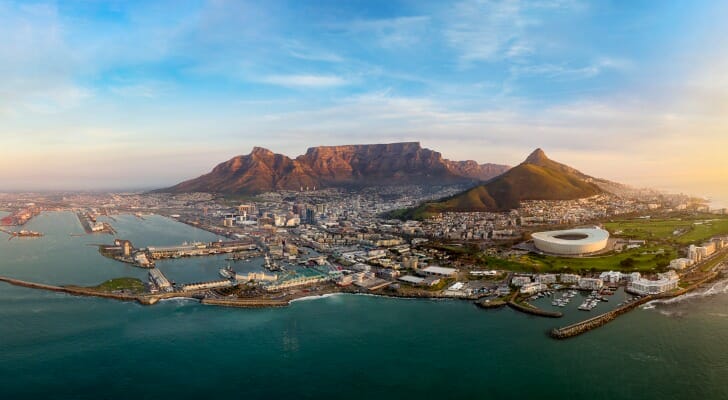Home to both lively landscapes and a highly diverse and fascinating culture, South Africa stands out as a place of opportunity for many potential retirees. Bask in a glowing sun while out on the golf course or relax in the shade on a beach. If you are a foodie or oenophile, you can enjoy this country’s culinary treats and excellent wines. Between all the things to do and see, this southernmost African nation, where English is widely spoken, can sound like a dream. So, if you’re considering how to retire in South Africa here are a few areas to look into first. A financial advisor can help you determine if your U.S.-based assets will cover expenses in the Rainbow Nation.
Cost of Living and Housing
A common draw for U.S. expats when selecting a country to settle down in is a low cost of living, and South Africa tends to suit that criteria. Generally, its cost of living is 41.77% lower than that in the U.S., with rent 60.88% lower on average as well.
According to Numbeo, one of the largest cost-of-living databases, these averages stay relatively consistent across the country’s most important cities. Whether you examine one of its three capital cities, Pretoria, Bloemfontein and Cape Town, or its most populated urban location, Johannesburg, both the average cost of living and rent remain low.
For example, Johannesburg’s cost to rent a one-bedroom apartment in a city center averages around $470.22, and the price to purchase an apartment, by foot, in the same location is $92.53. According to World Population Review, Johannesburg’s 2021 population sits around 5,926,668. A comparable city is the U.S.’s New York City with 8,622,357. The cost of living in comparison to New York is less than half at 54.59%. For example, the average single bedroom in New York City is $3,269.65 for rent and $1,515.09 per square foot to purchase.
So, if your ideal retirement location has lower-cost housing, regardless of whether you want to rent or buy property, South Africa may be a suitable location.
Retire in South Africa – Visas and Residence Permit
While South African does have a visa that foreign nationals can apply for in the hopes of retiring there, there is no set age range for such a visa. Anyone of any age can apply for the retired persons’ visa as long as they meet other requirements.
It’s important to note that none of these rules concern working in South Africa. Generally, to retire in a foreign country and obtain a retirement visa, work is barred from the applicant. They have to have a sustainable pension to support them instead. However, while you still must prove a set amount of assets or funds, you are free to work.
Retirees tend to take two routes when retiring in South Africa: a retired permit or an independent financial person permit. The main difference between the two is that the retired permit allows for a temporary residency basis. A retired visa for a temporary residence is valid for up to four years and asks for a minimum income per month or year to be proven. Similarly, a retired permit application for permanent status asks for an increased minimum monthly income. Still, it lasts forever as long as the holder visits South Africa once every three years.
Lastly, the independent permit requires a minimum net worth of about $800,000 at time of writing and fee of about $8,000 at time of writing, but it has the same lifespan as the retired permit.
Retire in South Africa – Healthcare
The majority of South Africa’s hospitals are public, which tend to be overcrowded and under-resourced. They often have issues you would expect from an overburdened staff, including a need for updated equipment.
Expats are more likely to find excellent healthcare through the country’s private hospitals and practitioners, which can mostly be found in major urban areas. There, you’ll find several well-established, nationwide hospital chains that offer a high standard of care. You also won’t run into the issue of non-English speaking staff at these hospitals. However, their services are expensive. While South Africa’s Bill of Rights demands healthcare for all, it is based on a sliding scale. Typically, expats are put into a category that forces them to pay for healthcare out of pocket, so it’s a better idea to have private health insurance.
Retire in South Africa – Taxes

South Africa experiences extreme income inequality. The Gini coefficient, the standard index to measure inequality, of the country is 0.58 – one of, if not the, highest among any nation. South Africa, as a result of this and historical instability, is only just beginning to recover. However, because of this wealth disparity, personal income tax and most forms of revenue are only collected from a small percentage of the population.
South Africa’s personal income tax rates for residents are progressive and range from 18% to 45%, depending on your income bracket. Non-residents are only subject to taxes on income made from South African sources. The country defines a resident as someone present in the country for more than 91 days during the current and preceding five years.
It’s important to keep in mind that the U.S. requires all of its citizens to file taxes regardless of where they currently are in the world.
Retire in South Africa – Safety
The U.S. Department of State warns its citizens that South Africa is a location that experiences crime and civil unrest. More than the petty theft you may find in a travel advisory, South Africa experiences violent crimes, such as rape and mugging, which generally only occur at a higher frequency in central urban locations after dark. It’s also possible to find a demonstration or protest that has devolved into violence, disturbing the area and its traffic in the process.
On a lower level, some crimes, such as scams, also call for caution. It’s essential to be careful with your money, where you walk (especially at night) and keep your wits about you when interacting with things such as ATMs. Some are tampered with to obtain your cards and information.
Bottom Line

South Africa offers many potential benefits to the average retiree. It’s a naturally beautiful country that hosts a number of exciting sights and events to keep anyone entertained. Not only that, it’s a low-cost option in comparison to many countries and doesn’t put as many regulations in place for its retired foreign-born residents. There are legitimate safety concerns for the average tourist and a healthcare system that needs fine-tuning. Depending on your preferences for your retirement, the benefits may outweigh the difficulties or vice versa.
Tips for Achieving Your Retirement Goals
- A financial advisor can help you create a financial plan for your retirement needs and goals. SmartAsset’s free tool matches you with up to three vetted financial advisors who serve your area, and you can interview your advisor matches at no cost to decide which one is right for you. If you’re ready to find an advisor who can help you achieve your financial goals, get started now.
- Retiring can come with all sorts of unexpected costs and obstacles. This is true even when you’re looking at a low cost of living country like South Africa. To prepare yourself, stop by our retirement calculator. All you have to do is input a few details about where you want to retire, when you want to retire and the value of your savings.
Photo credit: ©iStock.com/Byelikova_Oksana, ©iStock.com/ManoAfrica, ©iStock.com/Picture_Perfect
